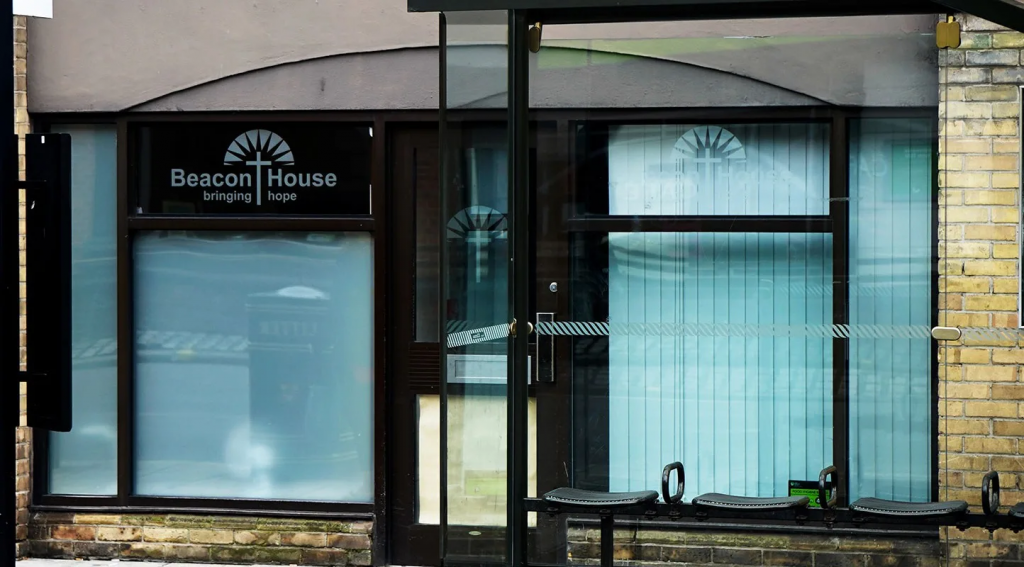
By Maria Szin and Alissa Naydenova
For this year’s Rebellion, REBEL chose to support its first local charity. In the heart of Colchester, Beacon House offers more than just a shelter to those in need. The Christian organisation combats homelessness by looking beyond the immediate needs of its visitors, transforming lives via a different approach. Through its work with numerous organisations, Beacon House has created a network strengthening the impact on the community and tackling homelessness.
In January 2020, Steve Brown became CEO of Beacon House, bringing a fresh viewpoint to the organisation. Having worked in various agricultural firms, he also volunteered extensively around Eastern Europe in the early 1990s, assisting individuals in need following the fall of the Soviet Union. Brown’s experiences in Bulgaria, Romania, and Albania enabled him to keep helping vulnerable groups in Colchester.
Beacon House has become a family where individuals support each other in every possible way. With the nurses’ crucial understanding and acceptance of the diverse conditions of those in need and the cooks and diners buzzing with conversation in the kitchen, it is not just a shelter but a haven where people find solace, understanding, and a sense of belonging.
We sat down with Steve and once the camera started rolling, he answered three crucial questions: how, what, and why?
How did Beacon House Ministries start?
(Steve) It was 1996, and a group of Christians noticed the lonely people around Colchester Baptist Church. They wanted to give homeless and marginalised people a sense of community. It became a “Beacon of Life,” exemplifying a “practical expression of God’s light” and valuing acceptance, empowerment, and change – principals we can all stand behind, even when not religious.
What does Beacon House stand for?
(Steve) The short answer is to “transform lives.” In practice, that is a demanding and ambitious task – difficult to achieve when dealing with precarity. Brown’s goal is to challenge the people who seek his help. It is not just about giving them a warm meal and a shower – it is about encouraging self-fulfilled, independent living. When someone goes to 24 Crouch Street, they will receive help, but nobody will “walk the road for them.” Whether they go in for a shower or to wash their clothes, the tools will be at their disposal, but they will have to clean the bathing area after use, start the machine, and fold their laundry. It is about putting in the work: the first step toward independent living.
Why is Beacon House crucial to our community?
(Steve) Every year, around 450 individuals go to Beacon House for help. They walk in through those doors, knowing they will receive medical attention, a set of clean clothes, and someone who will hear them out.
–
As Steve explained during our sit-down, 95% of people who come to him have suffered a relationship breakdown. To cope, they spend their money on alcohol and drugs, ending up living on the streets. Most of these people don’t know who they are and where they fit in society; they are captives of addiction. To help them come out on the other side, Beacon House works with organisations such as Open Road, a drug and alcohol recovery service, and Phoenix Homes Colchester, a local provider of supported housing for people struggling with mental health issues.
When they want to “move forward,” they also have access to budgeting courses and occupational therapy to discover new opportunities and improve their already-existing abilities. “What you give them on the streets goes toward the wrong things,” declared the CEO of the charity, “it is detrimental to them.” Some people might pretend to be homeless to scam passers-by, which cements how indispensable Beacon House is to the community. It provides help for those who genuinely need it while saving taxpayer money by keeping homeless people out of police custody. Always looking for volunteers to lend a hand – or an ear – Beacon House brings the community together.
While not everyone can handle such a mentally exhausting line of work, switching from a feeling of euphoria after helping someone, to grief if they die on the streets, there are other ways to contribute. Beacon House also welcomes food donations, such as tinned tomatoes, coffee, and jam – a complete list is available on their home page. Ultimately, homelessness is much more a mental health crisis than a housing problem, making financial donations the foundation of their work. £5 can pay for a shower and a set of toiletries, and £10 for a monthly supply of vitamins and a flu pack. So, let’s make the money raised from this year’s Rebellion count: someone’s past should not define their future.
– We will leave you with one last quote from Steve Brown’s office, defining Beacon House’s mission.
“Homeless people are human beings with hopes, dreams and aspirations, and there is nothing whatsoever that says their past has to define their future. Our task, and indeed our privilege, is to advise them, assist them and walk with them on that journey.”